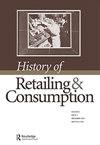‘New wine in new bottles’: class politics and the ‘uneven electrification’ of colonial India
Q2 Arts and Humanities
引用次数: 1
Abstract
ABSTRACT The introduction of electricity supply into urban colonial India in the late-nineteenth and early twentieth centuries coincided with the emergence of an Indian middle class debating its own identity and autonomy, and the development of ‘modern’ and Westernised urban centres. This article examines how colonial plans for urban and domestic electrification were influenced by the class politics of the urban Indian middle class and its varied notions of nationalism, traditionalism and modernity. I investigate how the colonial government and promoters of electrical technologies responded to the opportunities and constraints of the urban Indian middle-class domestic sphere to refashion the language of electricity to be contiguous with the political and social exigencies of the emerging Indian middle class. Looking at the language of electrification that arose in the social, cultural and political contexts reveals how far class and identity politics were matters of importance in what has been termed ‘the uneven electrification of the British empire’. While this article concentrates on urban colonial India, it brings to light newer aspects of the place of electricity within processes of urban development and class politics, and vice versa, especially within the unsettled cultural and social backgrounds of colonial societies.“新瓶装新酒”:阶级政治与殖民地印度的“不均衡电气化”
19世纪末和20世纪初,电力供应进入印度城市殖民地,与此同时,印度中产阶级开始辩论自己的身份和自治,“现代”和西方化城市中心也开始发展。本文考察了印度城市中产阶级的阶级政治及其民族主义、传统主义和现代主义的各种观念如何影响城市和家庭电气化的殖民计划。我研究了殖民政府和电力技术的推动者如何回应印度城市中产阶级家庭领域的机会和限制,以重塑电力语言,使其与新兴印度中产阶级的政治和社会紧急情况相一致。看看在社会、文化和政治背景下出现的电气化语言,就会发现阶级和身份政治在所谓的“大英帝国不平衡的电气化”中是多么重要。虽然这篇文章关注的是印度殖民时期的城市,但它揭示了电力在城市发展和阶级政治过程中的更新方面,反之亦然,特别是在殖民社会不稳定的文化和社会背景中。
本文章由计算机程序翻译,如有差异,请以英文原文为准。
求助全文
约1分钟内获得全文
求助全文
来源期刊

History of Retailing and Consumption
Arts and Humanities-History
CiteScore
0.50
自引率
0.00%
发文量
3
 求助内容:
求助内容: 应助结果提醒方式:
应助结果提醒方式:


